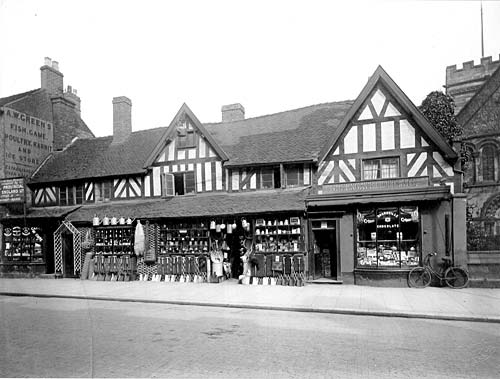
Private Alfred Ernest Dale 6/2995
Researcher, Val Hollis, has been researching the life and career of Alfred Dale, who was born in Stafford in 1878 and a member of 11 Platoon, 12th Nelson company, 1st Canterbury Infantry Battalion, NZ Expeditionary Force at the Somme.
Alfred’s father was Philip Dale, a prominent local shop keeper in Stafford. He owned and ran an ironmongers shop in Greengate Street (Dale’s) which was mentioned by Charles Dickens as ‘the little iron mongers shop’ when he visited the town in 1852. Philip retired from his business in 1912 on account of failing health and eyesight, and went to live at Wolseley cottage, Colwich.
Alfred was evidently a very keen and accomplished sportsman – he took part in swimming, water polo, and fishing. He emigrated to New Zealand, and is noted on the NZ census lists as residing in Hawara (1905-6), and then Wairau, Marlborough from 1911-14. His occupation is given variously as Railway Porter and Railway Shunter. Alfred’s name appears in the New Zealand Nominal Roll for 1914-18, and his next of kin is given as Mrs P Pointon of ‘Ashleigh’, Great Wyrley, Walsall, Staffs (his cousin Mary/’Pollie’).
He is mentioned in an article in the Marlborough Express, (vol XLIX, 5 June 1915, page 5) as one of the departing soldiers under the headline ‘Send Off at Picton’, and the by-line ‘Farewell to Railway Workers’ has an account of a musical evening to send the volunteers off to war.
Initially Alfred joined the 7th Unit of the Canterbury Infantry Battalion. What we then learn of his experience in the war comes to us through preserved letters to his cousin. He had arrived in France from Egypt, and his war service record is detailed in a letter to Pollie, dated 29/05/1917, from the Base Records Branch, NZ Military Forces, Wellington :
Disembarked Suez 18.11.15
Joined Battalion Ismailia 04.02.16
Embarked for France on Franconia, Port Said 06.04.16
In a letter on 23 July 1916 Alfred described the general conditions in France and mentioned ‘Fritz seems to save up a special hymn of hate for Sundays..’, and ‘I suppose it will soon be time for our push..’ (The ‘push’ to which Albert made reference, was to be the battle of the Somme.)
By 26th August 1916 Alfred was discussing day to day issues in France
- ‘the socks are good but would be better at least twice as thick. If you send me a pair in a month it will fit in nice…’
- ‘I have just washed my only shirt and underpants..’
- ‘After 42 days at the front we have been on the move, it is a treat to get a good night’s rest’..
- ‘At present I am camped on the straw, full up with pudding and smoking one of Players which are very good. Pudding was just starting to go mouldy, I received it an hour ago…’
By 6am on 15 September 1916 the soldiers had had breakfast and a tot of rum. The NZs official history records a ‘ghostly pallor was creeping into the sky .. the weather held out every prospect of a fine day’. Precisely at 6.20am the guns roared into life and the leading waves of infantry ‘went over the top into action’ near Longueval, France, in trenches to the west. Eight companies advanced across open land between shell holes behind a ferocious artillery barrage that crept ahead of them at the rate of around 50 meters per minute. By 6.50am, the German trench line was in New Zealand hands. The advance continued, and by late afternoon, the Division had achieved all its objectives, forcing back the enemy and clearing the village of Flers.
Alfred was fatally wounded and missing on the Somme on 16 September 1916.
A letter dated 28th January 1917 from Archibald Cole Brown, Station Master, Blenheim, Marlborough, NZ noted that Alfred had been reported as ‘killed in action’. He refers to another letter he has seen from a ‘boy’ who was with him when he fell – a Private E W Gillet 6/2139. There follows an abstract from this letter in which he confirms that it was in the battle for Flers; they were advancing under very heavy shell fire and a shell landed in ‘our’ platoon. They had only got about ‘halfway across’ when the shell knocked them down. E Gillett then describes finding himself in a shell hole with Alfred, who had had both of his legs ‘disabled’, another man wounded in the head and two killed outright. All ‘Blenheim boys’. He dressed Alfred’s wounds as well as he could as he could not be moved. E Gillett went for assistance to the stretcher bearers, and then went on himself to the ‘clearing station’. He was not able to hear ‘any tidings’ of Alfred, although he was afraid there was ‘not much chance for him’. AC Brown hoped the knowledge that he died ‘doing his bit’ would bring some comfort to Alfred’s relatives.
Alfred Ernest Dale has a marked grave in Caterpillar Cemetery, near Longueval, France. The cemetery sits in an area seized by the Royal Scots and 9th Rifles on 14 July 1916. It contains 5,197 UK dead, 214 New Zealand and 98 Australian.
